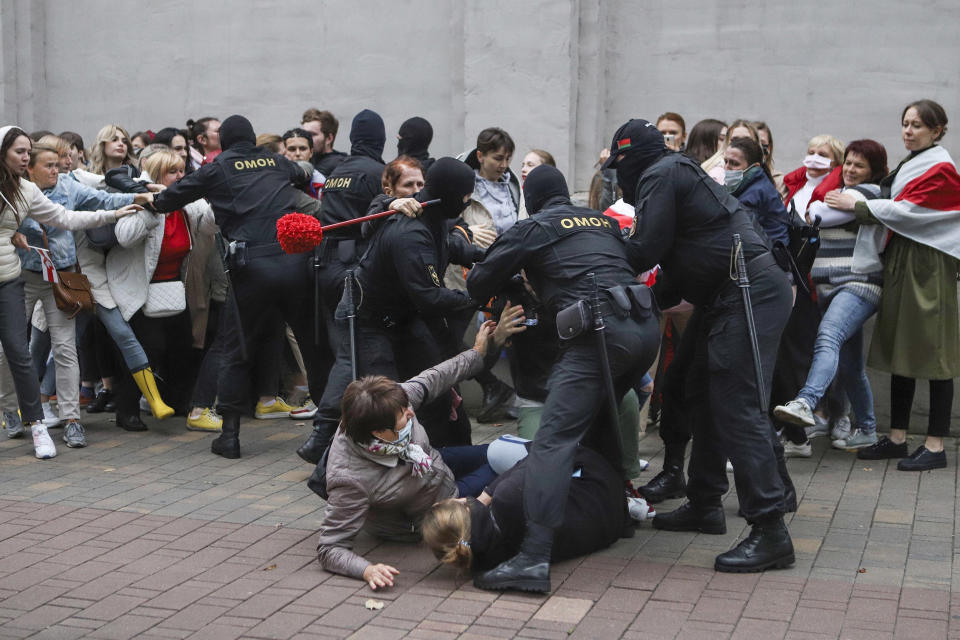Concerns grow for Belarus protest leader who resisted deportation
A prominent Belarusian opposition leader tore up her passport to avoid being forcibly taken across the border into neighboring Ukraine, her two associates said on Tuesday.
According to Belarusian authorities, Maria Kolesnikova, who became one of the faces of the mass protests against President Alexander Lukashenko that began after a disputed presidential election in August, was detained while trying to flee the country on Tuesday.
But her two associates and Ukrainian officials have disputed that version of events, saying Kolesnikova was driven to the Ukrainian border against her will and resisted attempts to expel her from the country.
NBC News could not independently verify the government's claim or the account of Kolesnikova's associates.
On Monday, eyewitnesses told Belarusian media Kolesnikova was forced into a van by masked men in the center of Minsk and taken away.
Her two associates, Anton Rodnenkov and Ivan Kravtsov, said in a press conference in Kyiv on Tuesday that they had also been detained by Belarusian officials early on Monday, who escorted them to the border later in the evening and then put Kolesnikova into their car and told them to cross into Ukraine.
"As soon as she ended up in the car and saw her passport, she immediately took it and tore it up into little pieces and crumpled the pieces and threw them out the window at the people standing around the car," Rodnenkov said.
"After that, she opened the back window and got out [through the window] and walked towards the Belarusian border,” he added.
Both Rodnenkov and Kravtsov crossed the border into Ukraine.
Kravtsov called Kolesnikova’s move to tear up her passport “a very smart decision” as it made it legally impossible for her to cross the border.
"She is a real hero, you must understand that," he said.
Earlier on Tuesday, Ukraine’s deputy interior minister Anton Gerashchenko also told the media that, in a “courageous act,” Kolesnikova had successfully prevented "a forcible expulsion” from her country, without specifying details.

Amid concerns for her whereabouts, aides in Minsk said Wednesday Kolesnikova's father was informed that she was being held at a detention center in the capital. This was also confirmed by her lawyer, Ludmila Kazak, to Russian state news agency Ria Novosti.
Later on Wednesday, the country's investigative committee said in a statement that Kolesnikova was being held in detention in connection with a criminal probe launched into the coordination council, where Kolesnikova was a senior figure. The council was formed by the opposition to negotiate a peaceful transfer of power in the wake of the disputed election.
Exiled opposition leader Svetlana Tsikhanouskaya commended Kolesnikova’s bravery, praising her refusal to leave Belarus.
"I hope that she will be released soon," Tsikhanouskaya said. "Because it would be one more mistake from our authorities if they will put her in jail without any reason."
Lukashenko has maintained that Kolesnikova tried to flee to Ukraine and was rightfully detained in an interview with several Russian state agencies on Tuesday.
He also said that she was thrown out of the car by her associates, rather than tried to escape.
The U.S. State Department said Tuesday it was “deeply concerned” by the reported abduction of Kolesnikova and her two associates and is considering additional targeted sanctions "to promote accountability for those involved in human rights abuses and repression in Belarus."
Kolesnikova is not the first opposition figure to disappear under mysterious circumstances in recent weeks.
Olga Kovalkova, an aide of Tsikhanouskaya and a senior figure in the coordination council, said last week she was forced by Belarusian authorities to leave the country for Poland.
On Wednesday, supporters of opposition politician Maxim Znak, who worked closely with Kolesnikova, said he was also detained by masked men. He was one of the last high-profile members of the coordination council to remain in Minsk.

